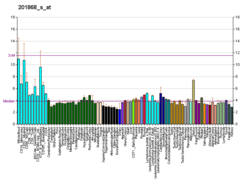TBL1X
Transducin (beta)-like 1X-linked, also known as TBL1X, is a protein which in humans is encoded by the TBL1X gene.[5]
Function
[edit]The protein encoded by this gene has sequence similarity with members of the WD40 repeat-containing protein family. The WD40 group is a large family of proteins, which appear to have a regulatory function. It is believed that the WD40 repeats mediate protein-protein interactions and members of the family are involved in signal transduction, RNA processing, gene regulation, vesicular trafficking, cytoskeletal assembly and may play a role in the control of cytotypic differentiation. This encoded protein is found as a subunit in corepressor SMRT (silencing mediator for retinoid and thyroid receptors) complex along with histone deacetylase 3 protein. This gene is located adjacent to the ocular albinism gene and it is thought to be involved in the pathogenesis of the ocular albinism with late-onset sensorineural deafness phenotype. This gene is highly similar to the Y chromosome TBL1Y gene.[5]
Interactions
[edit]TBL1X has been shown to interact with:
References
[edit]- ^ a b c GRCh38: Ensembl release 89: ENSG00000101849 – Ensembl, May 2017
- ^ a b c GRCm38: Ensembl release 89: ENSMUSG00000025246 – Ensembl, May 2017
- ^ "Human PubMed Reference:". National Center for Biotechnology Information, U.S. National Library of Medicine.
- ^ "Mouse PubMed Reference:". National Center for Biotechnology Information, U.S. National Library of Medicine.
- ^ a b "Entrez Gene: TBL1X transducin (beta)-like 1X-linked".
- ^ a b c Zhang J, Kalkum M, Chait BT, Roeder RG (March 2002). "The N-CoR-HDAC3 nuclear receptor corepressor complex inhibits the JNK pathway through the integral subunit GPS2". Mol. Cell. 9 (3): 611–23. doi:10.1016/s1097-2765(02)00468-9. PMID 11931768.
- ^ a b c Guenther MG, Lane WS, Fischle W, Verdin E, Lazar MA, Shiekhattar R (May 2000). "A core SMRT corepressor complex containing HDAC3 and TBL1, a WD40-repeat protein linked to deafness". Genes Dev. 14 (9): 1048–57. doi:10.1101/gad.14.9.1048. PMC 316569. PMID 10809664.
- ^ a b Yoon HG, Chan DW, Huang ZQ, Li J, Fondell JD, Qin J, Wong J (March 2003). "Purification and functional characterization of the human N-CoR complex: the roles of HDAC3, TBL1 and TBLR1". EMBO J. 22 (6): 1336–46. doi:10.1093/emboj/cdg120. PMC 151047. PMID 12628926.
- ^ a b Li J, Wang J, Wang J, Nawaz Z, Liu JM, Qin J, Wong J (August 2000). "Both corepressor proteins SMRT and N-CoR exist in large protein complexes containing HDAC3". EMBO J. 19 (16): 4342–50. doi:10.1093/emboj/19.16.4342. PMC 302030. PMID 10944117.
- ^ Guenther MG, Yu J, Kao GD, Yen TJ, Lazar MA (December 2002). "Assembly of the SMRT-histone deacetylase 3 repression complex requires the TCP-1 ring complex". Genes Dev. 16 (24): 3130–5. doi:10.1101/gad.1037502. PMC 187500. PMID 12502735.
Further reading
[edit]- Bassi MT, Ramesar RS, Caciotti B, Winship IM, De Grandi A, Riboni M, Townes PL, Beighton P, Ballabio A, Borsani G (1999). "X-linked late-onset sensorineural deafness caused by a deletion involving OA1 and a novel gene containing WD-40 repeats". Am. J. Hum. Genet. 64 (6): 1604–16. doi:10.1086/302408. PMC 1377903. PMID 10330347.
- Guenther MG, Lane WS, Fischle W, Verdin E, Lazar MA, Shiekhattar R (2000). "A core SMRT corepressor complex containing HDAC3 and TBL1, a WD40-repeat protein linked to deafness". Genes Dev. 14 (9): 1048–57. doi:10.1101/gad.14.9.1048. PMC 316569. PMID 10809664.
- Li J, Wang J, Wang J, Nawaz Z, Liu JM, Qin J, Wong J (2000). "Both corepressor proteins SMRT and N-CoR exist in large protein complexes containing HDAC3". EMBO J. 19 (16): 4342–50. doi:10.1093/emboj/19.16.4342. PMC 302030. PMID 10944117.
- Matsuzawa SI, Reed JC (2001). "Siah-1, SIP, and Ebi collaborate in a novel pathway for beta-catenin degradation linked to p53 responses". Mol. Cell. 7 (5): 915–26. doi:10.1016/S1097-2765(01)00242-8. PMID 11389839.
- Zhang J, Kalkum M, Chait BT, Roeder RG (2002). "The N-CoR-HDAC3 nuclear receptor corepressor complex inhibits the JNK pathway through the integral subunit GPS2". Mol. Cell. 9 (3): 611–23. doi:10.1016/S1097-2765(02)00468-9. PMID 11931768.
- Yoon HG, Chan DW, Huang ZQ, Li J, Fondell JD, Qin J, Wong J (2003). "Purification and functional characterization of the human N-CoR complex: the roles of HDAC3, TBL1 and TBLR1". EMBO J. 22 (6): 1336–46. doi:10.1093/emboj/cdg120. PMC 151047. PMID 12628926.
- Yoon HG, Chan DW, Reynolds AB, Qin J, Wong J (2003). "N-CoR mediates DNA methylation-dependent repression through a methyl CpG binding protein Kaiso". Mol. Cell. 12 (3): 723–34. doi:10.1016/j.molcel.2003.08.008. PMID 14527417.
- Perissi V, Aggarwal A, Glass CK, Rose DW, Rosenfeld MG (2004). "A corepressor/coactivator exchange complex required for transcriptional activation by nuclear receptors and other regulated transcription factors". Cell. 116 (4): 511–26. doi:10.1016/S0092-8674(04)00133-3. PMID 14980219. S2CID 18807923.
- Yoon HG, Choi Y, Cole PA, Wong J (2005). "Reading and function of a histone code involved in targeting corepressor complexes for repression". Mol. Cell. Biol. 25 (1): 324–35. doi:10.1128/MCB.25.1.324-335.2005. PMC 538779. PMID 15601853.
- Gerlitz G, Darhin E, Giorgio G, Franco B, Reiner O (2005). "Novel functional features of the Lis-H domain: role in protein dimerization, half-life and cellular localization". Cell Cycle. 4 (11): 1632–40. doi:10.4161/cc.4.11.2151. PMID 16258276.







